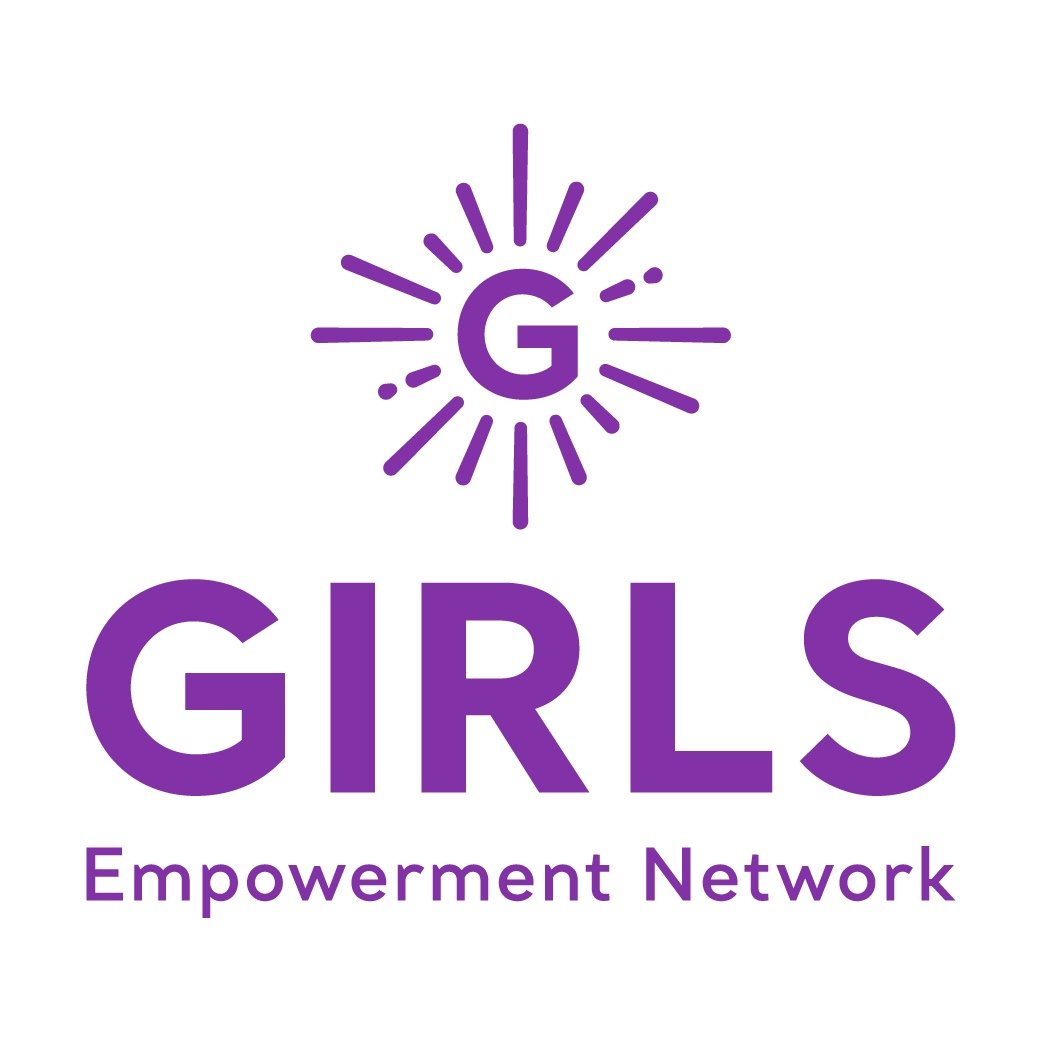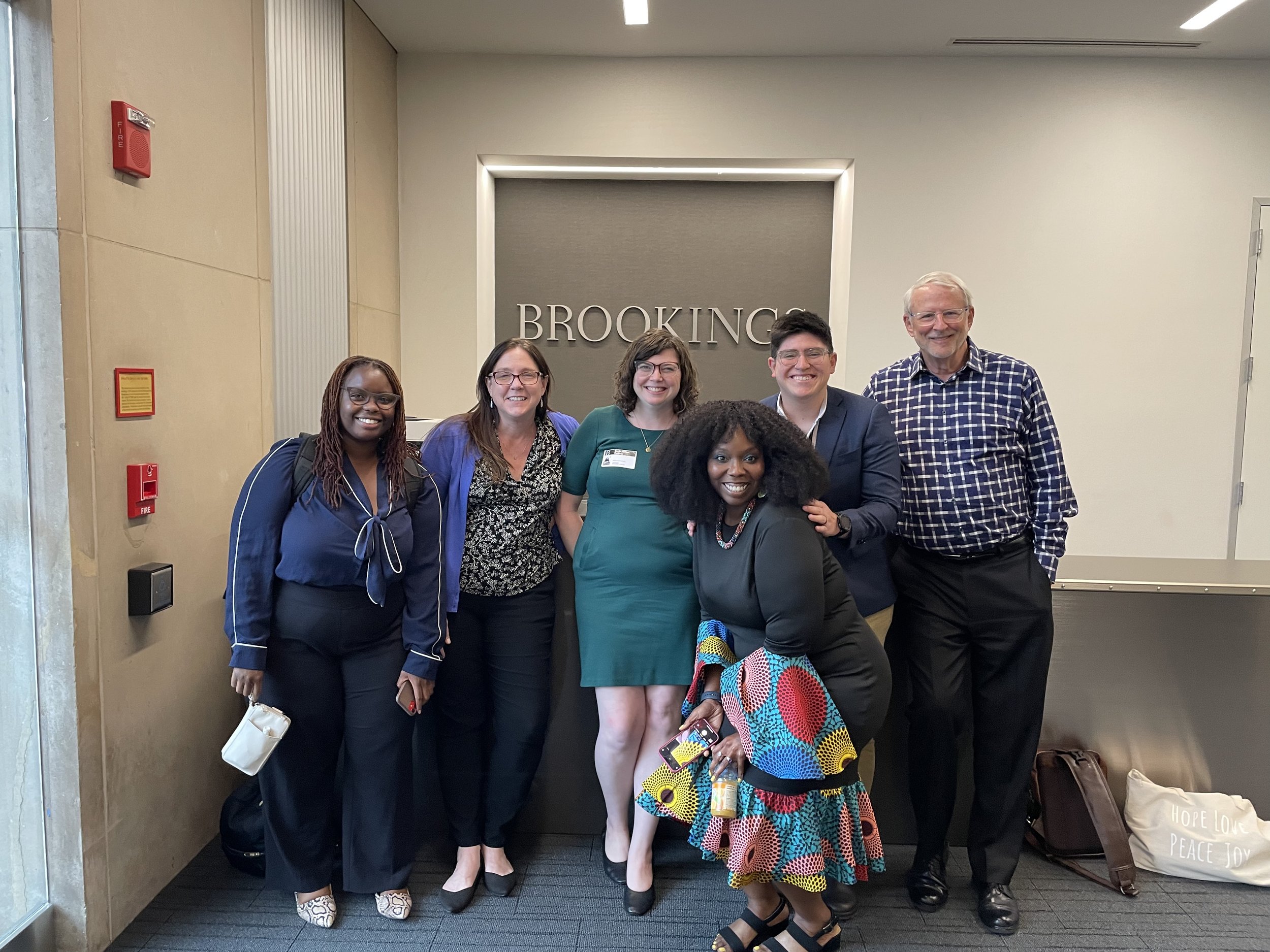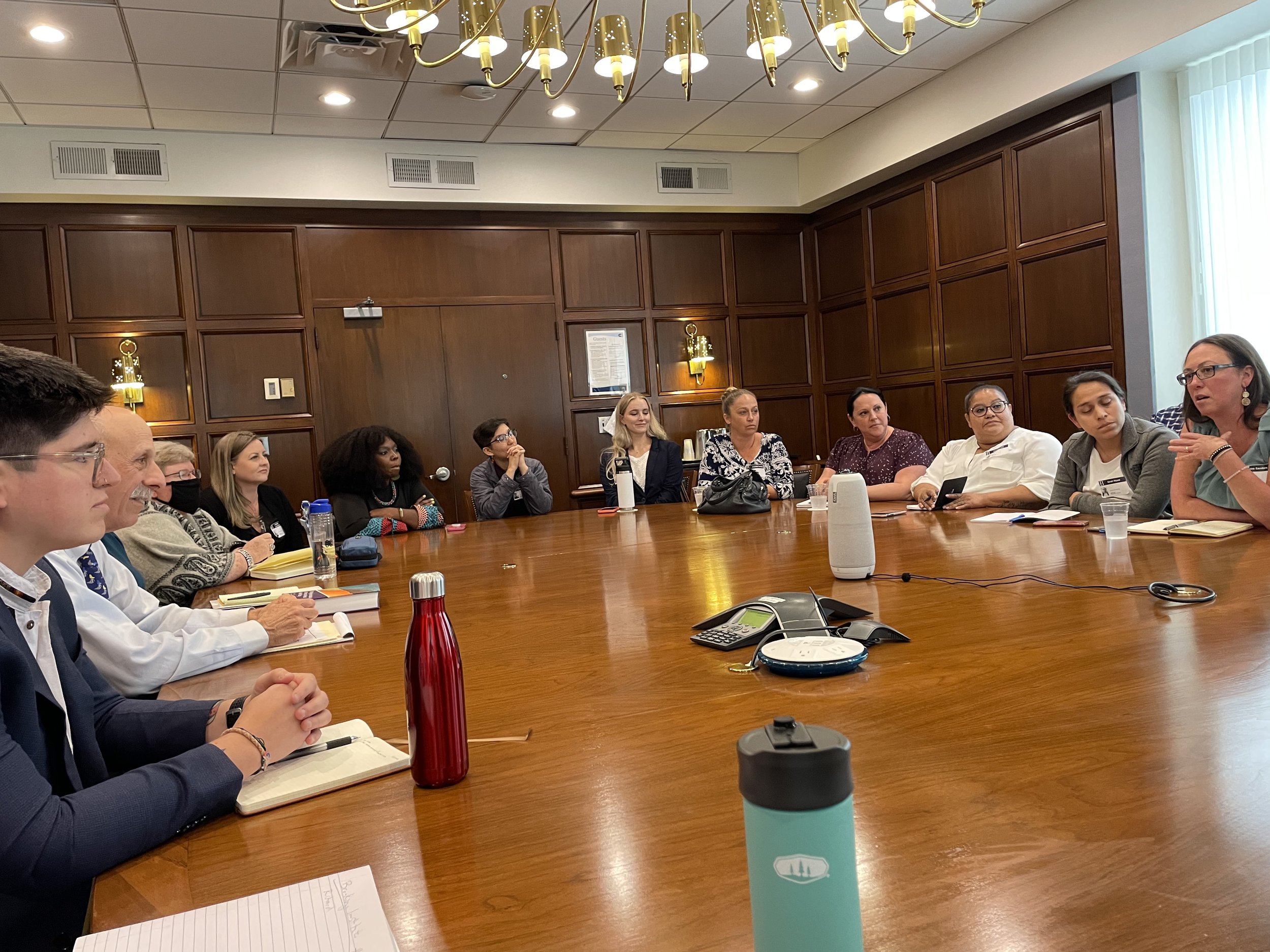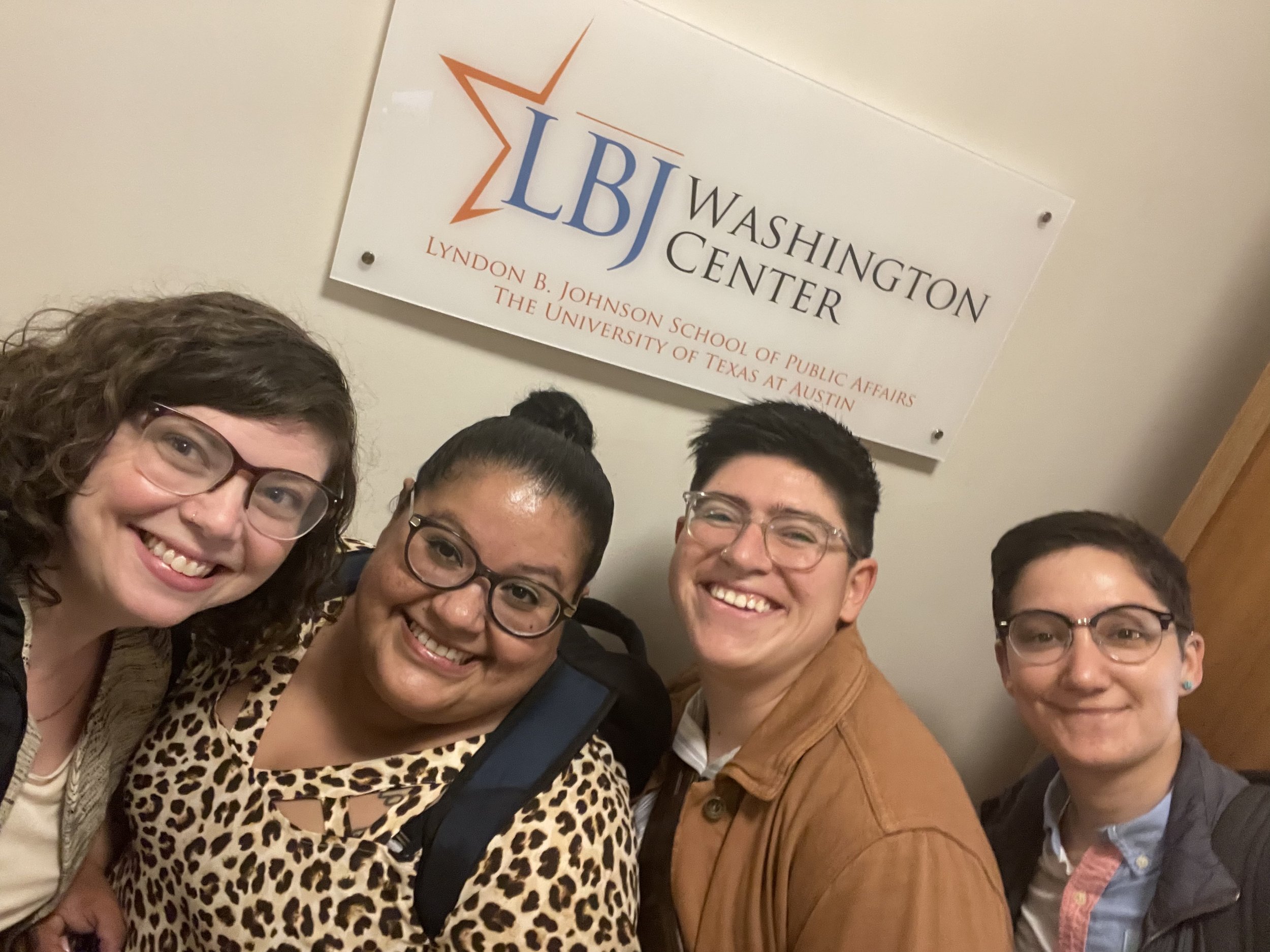Policy Fellows Make Actionable Change for Texas Youth at the Federal Policy Immersion Experience in Washington, DC
What does advocacy and Policy work have to do with the mission at Girls Empowerment network?
Advocacy work is in close alignment with Girls Empowerment Network's mission to ignite the power in girls. Through the Spark Change Project and the Hogg Foundation’s Mental Health Policy Fellows Program, we are helping to create the Texas that girls deserve. Beyond state advocacy work, national advocacy work is an important aspect of creating a world where girls are unstoppable.
Ana O’Quin, MSW joined Girls Empowerment Network in July as the new Mental Health Policy Fellow
The Hogg Foundation Policy Academy, facilitated by Texans Care for Children, provides opportunities for professional development and mental health policy and advocacy networking by awarding organizations grants to employ a Mental Health Policy Fellow. Girls Empowerment Network has been a recipient of this grant since July 2020. We said goodbye to our first fellow, Vanessa Beltran, at the end of July 2022, and we welcomed our second fellow, Ana O’Quin, MSW at the beginning of July 2022.
In May 2022, Vanessa Beltran and Dr. Sarah Miller-Fellows, our Director of Impact, traveled to Washington, DC for a Federal Policy Immersion Experience with the Hogg Academy. During a break in a Public Education Committee hearing at the Texas Capitol, Vanessa and Ana sat down to chat about Vanessa’s experience in DC and her time as a Mental Health Policy Fellow at Girls Empowerment Network.
Ana: Why is national policy work important, and how does it differ from state advocacy work?
Vanessa: “My graduate program at Harvard was in public health and focused specifically on social and behavioral sciences - how our environment and the social structures that we have built for ourselves impact people’s health. Since people from all over the country and the world came to attend, it was easiest for us to build some common language around national policy, rather than focusing on any one state. For me, the greater learning curve coming into the Hogg fellowship was Texas state policy rather than national policy.
The deep dive during the immersion trip helped me understand how these two connect and intersect. The biggest difference that I can tell between state and federal advocacy is timeline – Texas meets every other year, and it is the most fast-moving and intense six months you could imagine. Often the smallest but loudest groups have the most sway with legislators, and sometimes advocacy work felt like life or death. Whereas speakers at the policy immersion talked about issues they had been working on for years, if not decades. I know it is an oversimplification, and perhaps this pace is exacerbated by a highly charged environment due to the COVID-19 pandemic and our country’s reckoning with racial injustice. After having been in the hustle and bustle of Texas, I really came to admire the patience and tenacity of the people that do work at that national level. It was a reminder that for effective advocacy work, you must chip away at issues, realistically knowing you are looking at incremental changes across years (or even decades!) “
Ana: There was an all-star list of speakers and organizations you heard from during this trip, from national government institutions like the Substance Abuse and Mental Health Services Administration (SAMHSA) to renowned think-tank the Urban Institute. Which speaker was most influential for you personally and why?
Vanessa supported Spark Change Project peer facilitators in developing and delivering public testimony on issues that affect them and their community.
Vanessa: “That would have to be the McKinsey Health Institute – it was the first place that we went during our time there, but it framed what we heard from other speakers through their conceptualization of health. The MHI’s framework for improving health – they call it adding years to life and life to years – includes physical, mental, social, and spiritual health. It was true to my experience as a clinician, and the work I did at Girls Empowerment Network; we want to engage in policy work that enhances the well-being of all girls, not just a young person who has a diagnosable mental health condition or disorder. MHI communicates the value of good health to diverse institutions and helps foster the public-private collaboration that I think will be needed to generate real progress on issues of health equity.”
“...we want to engage in policy work that enhances the well-being of all girls, not just a young person who has a diagnosable mental health condition or disorder. ”
Ana: How many mental health policy fellows and mentors joined you on the trip? What has collaboration with them meant to you during the 87th legislative session and with your time at GIRLS?
Vanessa: “Nine other fellows and their mentors joined us on the trip, from organizations like Recovery People, Texas Alliance of Child and Family Services, the Texas Center for Justice and Equity and the Coalition of Texans with Disabilities.
I came into this role with a lot of academic training, hope, and idealism, but lacked on the experience front. With the Hogg Fellowship, I did not just benefit from the mentorship of my supervisor Sarah and the culture of Girls Empowerment Network, but also the depth of Texas legislative experience from other fellows and their mentors. Whenever I had questions, I had this whole community of people that I could ask - both the fellows and their mentors. It was nice knowing that as a beginner, there were people I could both learn from and learn alongside.
One of the beauties of the Hogg Fellowship is the Peer Policy Fellows, individuals in the fellowship who have lived experience in policy areas such as justice involvement and recovery. They were able to give input to real policy makers and researchers about ideas such as re-entry supports and community-based programs. Without their advocacy, these legislators would not have had the opportunity to hear that perspective of individuals who had been impacted by the systems they were creating laws for.”
Ana: Your agenda was broad – covering everything from the new 988 mental health crisis number to tracking national mental health data points. Which of the topics you covered was the most relevant to our mission to empower girls at Girls Empowerment Network?
Vanessa: “For me, what really landed was the conceptualization of thriving at MHI and working on policies that not only helped girls get through their day but experience joy, have nurturing and supportive relationships, and holistically enjoy life.
Hearing about 988 was incredible, especially in light of recent reports on the youth mental health crisis and suicide rates. Relevant to our mission is this rate for Black girls specifically, and the critical intersection of race and gender that creates unique pressure for them. It was encouraging to hear there is a resource available to them, and to any girl facing suicidal ideation. We need to continue to create a continuum of support for youth in crisis and I’m thankful we are taking steps in that direction.”
Ana: Any fun places you visited during your free time in DC? Any restaurants you recommend?
Director of Impact, Dr. Sarah Miller-Fellows and Vanessa make a stop at the White House during their time in DC
Vanessa: “I’m a huge museum person. I have a real love for learning. While I wouldn't necessarily say that they were all fun, I did really enjoy going to the National Museum of African American History and Culture and also the United States Holocaust Memorial Museum. I grew up going to historical museums, and they helped me recognize from a young age both our capacity to experience injustice and be resilient to overcome it. I have found even in the darkest tragedies people continue to find community and solidarity, making a way out of no way. Learning from their strength and courage helps me keep in perspective the responsibility we each have, even in small actions, to do all the good you can, for all the people you can, in all the ways you can, for as long as you can.
In terms of the best restaurant – we ate at Equinox our last night, which as a foodie and someone with a background in nutrition and food systems, I was really excited about. They focus on sustainability and seasonality, and source ingredients locally; all together they are very focused on planetary health. It was also our last night together in DC, and we had a moment to celebrate that I was leaving the next morning for my make-up COVID graduation over a cappuccino panna cotta.”
Ana: You are off to do some incredible work – could you share with us what your plans are, and how your time in the Hogg Policy Academy and at Girls Empowerment Network has prepared you for that work?
Vanessa: “I am going back to graduate school! This fall I will be attending Harvard Divinity School to study Religion, Ethics, and Politics. I’ve learned that in politics, we are not just dealing with data and studies, we are also talking about values and how different interpretations of those values can impact our institutions. I’ve learned from things like family, the cultural Catholicism I was raised in, and liberation theology, my responsibility to not only advocate for those society marginalizes but extend understanding to even those I may not agree with.
I learned from Hogg and policy advocates the value of holding steady when so much is happening around you. Beyond academic training and literature reviews, seeing an eight-year-old girl testifying on why she shouldn’t be put on a team of boys who she felt she had nothing in common with or seeing someone testify about how having a school counselor who cared about them saved their life is what brought the most impact. I could see the way in which these stories can move people. If you can move someone, and continue to work toward cultural change, then you can really make things different in a big way.”
“I learned from Hogg and policy advocates the value of holding steady when so much is happening around you.”
our thanks to the hogg foundation for mental health for Supporting girls empowerment network through the policy fellow initiative
Interviewing Vanessa is Ana O’Quin, who will be taking up Vanessa’s role as a Mental Health Policy Fellow. We want to thank the Hogg fellowship for their partnership with Girls Empowerment Network and the ways they have catalyzed our advocacy and policy work. Because of Hogg’s resources, mentorship, and collaboration, we now can create a better world for all girls.
Ana O’Quin, MSW, has experience in macro-level and policy work, with a passion for creating systems that help youth in Texas thrive. She has experience in community-based participatory research through the Center for Public Justice, state advocacy work through leading out NAMI Texas’s youth and mental health policy at the 87th legislature, and mental health coordination through Dell Medical School’s psychiatry and behavioral health department. During her free time, Ana runs an Austin matcha review account, spends all the time she can at Barton Springs reading, and plays piano.
Vanessa Beltran, MPH, RDN, LD brings together extensive experience in community health as a direct service provider and a systems-level perspective on improving population health through her training in public health. Her background is social and behavioral sciences, alongside experience in the fields of public health leadership and health communication, has equipped Vanessa with essential advocacy skills to promote policies that can improve girls' mental health. Vanessa served as the first mental health policy fellow at Girls Empowerment Network. In her free time, Vanessa likes to cook for friends and family, read non-fiction, watch films, and play with her two small dogs.






